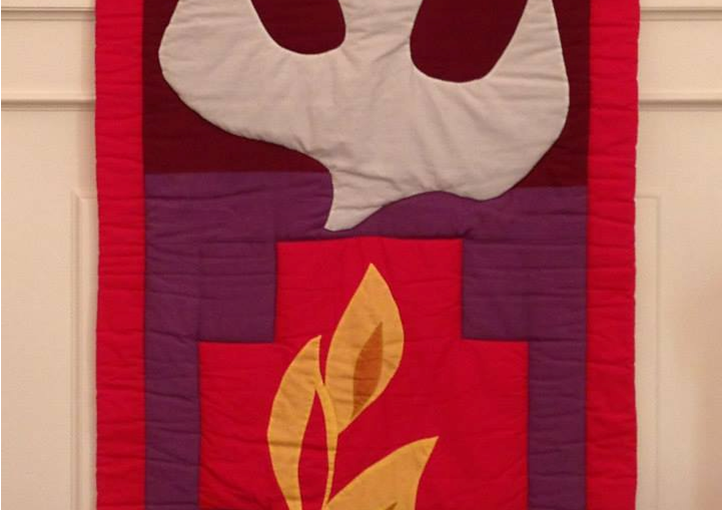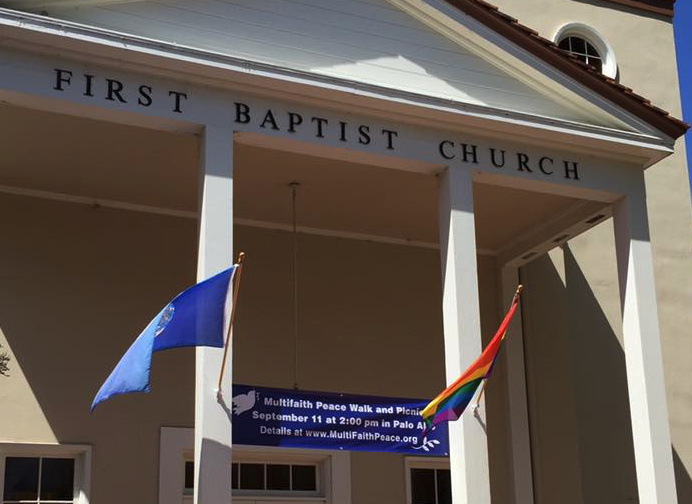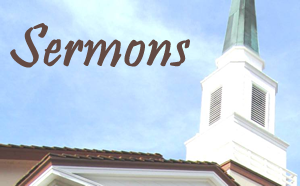A sermon preached by Rev. Dr. Randle R. (Rick) Mixon
First Baptist Church, Palo Alto, CA
Sunday, June 4, 2017
Text: Acts 2:6-21 (The Message)
With the crackle of flame and a whoosh of wind Pentecost is ushered in in this fantastic and familiar tale. It’s an important story that cycles around every year as we celebrate the “birthday of the church.” There are many angles a preacher could take in addressing this ancient word, but the thing that stuck out for me as we considered this text on Tuesday at Bible study is Peter’s role. In particular, I was caught by the text recording that Peter “raised his voice” (NRSV) or as The Message puts it, “spoke out with bold urgency.”
On the surface, it’s not a particularly remarkable thing. Surely someone addressing a large crowd, especially without the aid of amplification, would raise his voice or speak out boldly. The text tells us that, with the coming of the Spirit in wind and flame, all disciples are stirred up to speak out boldly. Not only do they speak out, but they are enabled to speak in such a way that people from a number of different language groups understand them. It’s something of a miracle, isn’t it? After all, these disciples are mostly Galilean peasants, poor, uneducated, unlikely to speak any language other than their own.
So, it’s a sort of circus, a kind of crazy block party, as the disciples pour out of the quarters where they have remained locked away since Jesus’ death. This week Carnaval was celebrated in San Francisco’s Mission District. It’s the largest multicultural festival held on the West Coast. Did you see and hear, either in person or on the news, the different cultures, brilliant costumes, and colorful languages represented as people took to the streets in celebration? I know Pentecost did not unfold exactly like Carnaval, but it gives you some sense of the rich diversity that gathered on the streets of Jerusalem that first Pentecost morning.
The writer of Luke says the crowd was baffled by the behavior of the disciples. He reports that “When they heard the sound, they came on the run. Then when they heard, one after another, their own mother tongues being spoken, they were thunderstruck. They couldn’t for the life of them figure out what was going on, and kept saying, ‘Aren’t these all Galileans? How come we’re hearing them talk in our various mother tongues?’”
We’ve played on Pentecost in the past with the variety of languages that might be spoken in our own congregation, including English, Spanish, French, Creole, Japanese, Cantonese, Taiwanese, Vietnamese, Korean, Hindi, Orilla, and Lebanese. Imagine how it would be in our little group if people started speaking in all of these languages at once and everyone somehow understood what was being said. It would be strange, exciting, confusing, a minor miracle. Or what if I stood up to preach and each of you understood in the non-English language with which you are familiar? Crazy, huh?
Well, whatever happened that day, the writer of Luke says the crowd cried out “They’re speaking our languages, describing God’s mighty works!” At the very least, the crowd understood the words they heard and some of them understood the Word that was behind those words. In the end, the writer reports that more than 3000 people joined the church or “their number” that day. It was the sort of evangelistic meeting that Billy Graham would envy, a mighty revival of sorts!
And speaking of evangelistic preachers, the preacher that day was none other than Peter. But before we crown Peter the chief spokesperson for emerging church for speaking out boldly on this day, let’s do a little background check. From the various gospel accounts, what do we know about Peter before this day? In my mind he was impulsive, inconsistent, an ignorant Galilean fisherman. I picture him as large, dominant, loud, opinionated, slightly boorish. One minute he has brilliant insight into the nature of Jesus’ calling and the next he is trying to stall Christ’s mission. He thinks he can walk on water until he discovers he can’t. He is a rock that is susceptible to crumbling at the most inopportune time.
In fact, in Luke’s gospel, the last time Peter is mentioned before Pentecost morning is on the night they arrested Jesus. We find him huddled in the courtyard outside the high priest’s house. Remember, earlier in the evening, when they we were all gathered around the table for the last supper, it was Peter who boldly proclaimed, “Lord, I am ready to go with you to prison and to death!” (Luke 22:33). A form of bold speech, to be sure, but listen to Peter’s prologue to Pentecost:
When they had kindled a fire in the middle of the courtyard and sat down together, Peter sat among them. Then a servant-girl, seeing him in the firelight, stared at him and said, ‘This man also was with him.’ But he denied it, saying, ‘Woman, I do not know him.’ A little later someone else, on seeing him, said, ‘You also are one of them.’ But Peter said, ‘Man, I am not!’ Then about an hour later still another kept insisting, ‘Surely this man also was with him; for he is a Galilean.’ But Peter said, ‘Man, I do not know what you are talking about!’ At that moment, while he was still speaking, the cock crowed. Christ turned and looked at Peter. Then Peter remembered Jesus’ word, how he had said to him, ‘Before the cock crows today, you will deny me three times.’ And he went out and wept bitterly (Luke 22:55-62).
The camera pans out on a weeping Peter, bowed down in shame, devastated by his own words of betrayal.
So, you see, for Peter to speak out boldly on Pentecost something has to have happened in his life, something that radically transforms him, for, indeed, from this day forward it is reported that he was a strong witness for the Jesus Way, capable of performing his own signs and wonders in Jesus’ name. When the Spirit comes and lights upon you, chances are that you will be changed in ways you never imagined. For Peter, there is apparently forgiveness, redemption, and empowerment in Pentecost; he is never the same again. A Galilean fisherman becomes the Rock on which the church is founded. If it can happen to him, why not you and me?
You see, speaking out boldly is not reserved for heroic figures from long ago, for the canonized saints of the church, for folk with special spiritual gifts, it is a way of life for those who claim to follow Jesus. Now don’t get me wrong, I’m not saying everyone who loves Jesus needs to get on a soapbox on the nearest street corner and win souls for Christ. But I am reminded again of that old Baptist hymn that affirms:
My life flows on in endless song;
above earth’s lamentation,
I catch the sweet, though far-off hymn
that hails a new creation.
No storm can shake my inmost calm
while to that Rock I’m clinging.
Since Christ is Lord of heaven and earth,
how can I keep from singing?
Through all the tumult and the strife,
I hear that music ringing.
It finds an echo in my soul.
How can I keep from singing?
And, no, that does not mean I expect any really committed Christian to join the choir (though we would be happy to have you.)
Another lectionary text for today is from the twelfth chapter of First Corinthians in which Paul proclaims:
Now there are varieties of gifts, but the same Spirit; and there are varieties of services, but the same Lord; and there are varieties of activities, but it is the same God who activates all of them in everyone. To each is given the manifestation of the Spirit for the common good. To one is given through the Spirit the utterance of wisdom, and to another the utterance of knowledge according to the same Spirit, to another faith by the same Spirit, to another gifts of healing by the one Spirit, to another the working of miracles, to another prophecy, to another the discernment of spirits, to another various kinds of tongues, to another the interpretation of tongues. All these are activated by one and the same Spirit, who allots to each one individually just as the Spirit chooses (1 Corinthians 12:4-11).
As the choir sang last week, there are “many gifts, one Spirit.” The challenge for each of us, as Christ followers, is to find our gifts and to use them, empowered by the Spirit, to bring about God’s Beloved Community. Each of us is encouraged to be “speaking out boldly,” in their own way, the truth of the gospel as we have come to know it. The great German theologian, Jurgen Moltmann, has written, “The sending of the Holy Spirit is the revelation of God’s indestructible affirmation of life and [God’s] marvelous joy in life. Where Jesus is, there is life. That is what the Synoptic Gospels tell us. Where Jesus is, sick people are healed, sad people are comforted, marginalized people are accepted, and the demons of death are driven out. Where the Holy Spirit is present there is life” (Jurgen Moltmann. The Source of Life, p. 19).
To the degree that you believe this is so – that God affirms and finds joy in all life, including yours and mine, and that “where Jesus is, there is life,” in the richest, fullest sense of the word, I invite you to take the strip of paper that was given you and write out what you might say (or do) in speaking out boldly in the Spirit of Pentecost. Take that truth claim with you. Pray about it. Invite the Spirit to move you to action. Be the church as best you can, be the Body of Christ, dream dreams, see visions, prophesy, if it comes to that. And remembering, now and then, that old affirmation of faith, sing to yourself, “Since Christ is Lord of heaven and earth, how can I keep from singing?” Amen.













